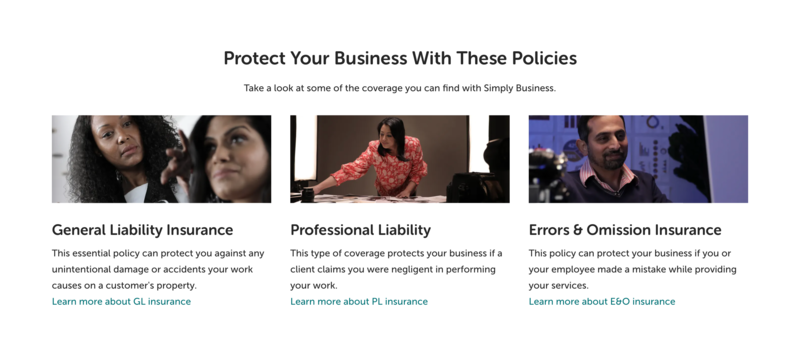Best Business Insurance
Based on In-Depth Reviews
- 200+Hours of research
- 54+Sources used
- 15Companies vetted
- 4Features reviewed
- 5Top
Picks

- Look for a policy that fits your business’ specific needs
- Consult with a business insurance agent if you have any doubts
- Creating a safe business environment will lower insurance costs
- Homeowners’ insurance usually does not cover work-from-home related damages
How We Found the Best Business Insurance
Our Top Picks: Business Insurance Reviews
If you own a business—big or small—you probably need some type of business insurance. Why? Because every commercial endeavor carries its own risks, and you don’t want to lack coverage if and when the worst happens. A business policy will not only protect your commercial, but also your personal assets from business-related losses.
All businesses are different, and each requires its own strategy for success. For this reason, when it comes to choosing the type (or types) of insurance you should get, it’s best to forgo the “one size fits all” approach in favor of an individualized assessment based on your business’ specific industry, size, location, number of employees, and the like.
And that’s what we did. Instead of looking for a “best overall” policy, we acknowledged that different businesses need different types of coverage and that the best for you might not be the best for another. Below, you’ll find our picks for best business insurance.
Does business insurance cover against COVID-19 related losses?
According to Tom Schryver, Executive Director at the Center for Regional Economic Advancement at Cornell University, a program that promotes entrepreneurship and small business success, “There are insurance products that do, but a general business liability policy would not. It’s really important to know what you’re buying when you’re in the market for insurance! Many small business owners were very distressed to find that while they had purchased business interruption insurance, which typically does cover loss of income due to a disaster, their policy specifically listed pandemics as a non-covered event.”
Best Brokerage for Small Businesses
Simply Business offers business insurance tailored to small businesses, specifically contractors and those in the wellness or professional services industries. By filling out a simple, 10-minute online form, customers can receive quotes from Simply Business’s insurance partners, some of the most reputable in the industry.
If for some reason customers can’t obtain an online quote, Simply Business offers its team of licensed insurance professionals to help in finding a policy for them.

Screenshot Simplybusiness.com, April 2021
Potential customers can search through a variety of different business insurance types including carpenter, handyman, landscaping, app development, lawyer, personal trainer, real estate agent, videographer, and many, many more.
Among the types of insurance offered are general liability insurance, professional liability insurance, errors & omissions insurance, and home-based business insurance.
Other highlights include:
- A free downloadable guide to understanding small business insurance
- Tailored insurance options from reputable insurers such as Axis, HArborway, and Travelers, among others.
- Simple to use website with industry-specific resources such as contractor and business licensing.
Best for Commercial Auto Coverage

Screenshot Progressive.com, August 2020
If you use cars, trucks, trailers, or any other type of vehicle for business purposes, check out Progressive Commercial’s auto insurance policies, available in all 50 states. They offer the broadest and most comprehensive coverage, including liability, collision, uninsured motorist, fire and theft, and medical expenses.
One of Progressive Commercial’s standout features is its “any auto coverage,” which covers any and all vehicles used as part of your business under one policy, rather than having to get an individual policy for each car.
Other highlights include:
- Progressive Commercial gives you 24/7 access to customer support and insurance experts specializing in auto claims
- Discounts are available for bundling policies and for “clean” driving records
- While Progressive offers a wide array of insurance policies, it's commercial auto policy is the only one underwritten by the company itself
- Seasonal policies allow for flexibility between “on” and “off” seasons
Best for Worker’s Compensation

Screenshot, Thehartford.com, August 2020
If you have one or more employees, we recommend The Hartford’s worker’s compensation policy—commonly known as “worker’s comp.” It’s one of the few that allows for pay-as-you-go financing, where you can constantly upgrade your coverage and costs according to actual payroll rather than business projections. This way, you know you’re paying for exactly what you need at the moment, no more and no less.
The Hartford also offers the most comprehensive coverage for injured workers, including access to The Hartford’s Preferred Medical Provider Network, with over 1 million health care providers; reimbursements for all lab tests; zero-deductible prescription filling at more than 65,000 pharmacies; and access to the Nursed Back to Health Program, offering physical, emotional, and occupational therapies.
Other highlights include:
- The Hartford has an A.M. Best rating of A+
- Discounts are available for bundling policies
- Claims service is available 24/7.
Click here to find out what regulations are in place in your state or city regarding worker’s compensation.
Best for Simple, 100% Online Management

Screenshot Coverwallet.com, August 2020
Recently acquired by the global insurance broker Aon, CoverWallet uses deep analytics and a proprietary algorithm to fast-track the insurance process and, most important of all, get the most accurate and affordable quote for your business. While it does not underwrite any of its policies—CoverWallet is a broker and not a provider—you can get quotes, make purchases, and manage all your policies on CoverWallet’s website, which includes a “digital wallet” for keeping track of everything having to do with your insurance. CoverWallet also offers the most popular business insurance types, including general liability, product liability, worker’s compensation, and business owner’s policies.
Other highlights include:
- CoverWallet is partnered with some of the most important insurance companies in the US, including Liberty Mutual, Berkshire Hathaway Guard, Starr, Atlas, Markel, and Hamilton.
- A personal advisor will guide you in finding the most accurate coverage for your business
Best for Commercial Cyber Protection

Screenshot CoverHound.com, August 2020
CoverHound’s CyberPolicy® offers two main options for people looking to purchase cyber insurance. In the first one, CyberPolicy acts as a broker that searches across more than 40 top cyber insurance providers to get you a list of the most accurate and affordable quotes for your business.
In the second one, you can purchase CyberPolicy’s proprietary policy, starting at $9.99 per month. This policy is meant to compliment cyber coverage from other providers, and includes cyber checkups, dark web monitoring, expert guidance, password management, document storage, and lots of other features that will prevent any cyberattacks from harming your business.
Other highlights include:
- CoverHound’s website is free to use and your information will not be shared with any third parties
- CyberPolicy is designed to cover 98% of small business types with up to $250 million in revenue
- CyberPolicy is available in all 50 states and D.C.
- 24/7 online customer support available
Best for Business Owners’ Policy (BOP)

Screenshot Allstate.com, August 2020
Allstate’s Business Owners’ Policy (BOP) is the most comprehensive in the industry and stands out for two main reasons. First, it can be tailored to as many as 36 different business categories, from restaurants and retail to transportation and professional services. This means that, whichever business you’re in, you’ll most likely find a policy that can be tailored to your specific needs, which can’t be done with the many “prepackaged” BOPs offered by most insurance companies.
Second, Allstate’s BOPs offer the broadest coverage on the market, including general liability and property coverage, as well as a number of add-ons, according to your business needs.
Other highlights include:
- Allstate has an A.M. rating of A+
- There are three tiers of coverage (basic, standard, and enhanced), which allows for pricing flexibility
- Customer support is available 24/7 via phone, email, or the company’s mobile app
- If you prefer in-person assistance, Allstate has more than 14,000 agents across the US.
- Allstate’s online portal lets you access a library of resources, manage your account, and file any claims you may have.

Further Insight into Our Methodology
In order to find the best insurance for your business, we first took an in-depth look at the industry at large and the realities of owning a small business in 2020. From there, we then determined which factors are essential when looking for top business insurance providers. The four factors are:
Coverage Options
Because no two businesses are identical, and each has its own needs and risks, we favored insurance companies offering a wide array of business policies, such as general liability, product liability, professional malpractice, workers’ compensation, and business owner’s policies (BOPs), among others. This way, you can get all your coverage from a single provider, rather than having to shop around.
We also prioritized business insurance providers that were flexible with their policies, allowing policyholders to customize their coverage until it met their specific needs. In 2020, the best business insurance companies include tailor-made coverages as part of their offerings.
Financial Strenght
An insurance company is only as good as its financial strength, a factor that is essential in determining whether or not the insurer will be able to pay your claim as agreed. Bells and whistles aside, this is the most important thing you should be looking for in an insurance company.
To determine the financial strength of the business insurance companies reviewed for this article, we looked at the ratings given by A.M. Best, a global credit rating agency that ranks insurance companies based on their financial stability. For this review, we only picked providers with a rating of A or higher, defined as excellent. For a business owner, this means that there’s a virtual certainty that your insurer will still be in business during the next five years.
Cost
Business insurance costs can only be determined on a case-by-case basis, including but not limited to your type of industry, number of employees, business location, sales revenue, and any safety measures you’ve taken to protect your business.
On average, small business owners in the US pay anywhere between $500 to $1,000 per year for commercial insurance, but you could pay less or lots more depending on what your business needs.
For this review, we gave special attention to insurance companies that kept their pricing within the national average while also offering more and better features than their competitors. We also looked at any discounts available for bundling or taking precautionary measures in your business.
Customer Service
If you want to get insurance, manage your policy, or file a claim, you want the process to run as seamlessly and quickly as possible. For this reason, we only chose insurance providers offering comprehensive, round-the-clock customer service with 24/7 online and phone service, access to business insurance agents, a dedicated web platform or app for managing your account, and, most importantly, a quick claims process and outstanding history of claims satisfaction.
Special consideration was given to insurance companies that also provided risk management tools for their business policyholders.
To determine an insurer’s customer service rating, we looked at each company’s support departments, reviewed their features, and read hundreds of online customer testimonials.
Helpful information about Business Insurance
There are over 30 million small businesses in the US—defined as a venture with a maximum of either 250 or 1,500 employees, depending on the industry—comprising 99.9% of all businesses in the nation. They are the backbone of our economy.
If you own a small business, you should definitely consider getting commercial insurance. Otherwise, you might be personally and financially liable for any business-related damages. With the right policy, you’ll not only be able to protect your business and make sure it thrives regardless of risk, but will also protect your personal assets from lawsuits and creditors. According to the Small Business Administration, these are the four steps you should take before purchasing a policy for your business:

While there are dozens of business insurance types in the market, each covering a specific area of a business, these are the most popular among small businesses in the US:
Business Property Insurance: This type of policy covers any business-related buildings, equipment, property, and inventory.
Commercial Auto Insurance: Most property insurance policies will not cover the vehicles used for your business. For this reason, if you use any type of truck, car, or van for business purposes, you should get commercial auto insurance.
Business Income Insurance: Also known as business interruption insurance, this type of policy helps replace lost income in case your business has to shut down totally or partially. In many cases, it can also help you keep paying expenses–including payroll–the same as if your business were up and running.
Professional Liability Insurance: This type of policy will cover you for any lawsuits caused by errors made by you or any of your employees during the regular course of business, and which financially or otherwise affect a client or third party.
Workers’ Compensation Insurance: Commonly known as “worker’s comp,” this type of insurance covers an employee’s medical—and other—costs arising from a work-related injury or illness, while also providing the resources necessary for the employee to get back to work. Moreover, certain worker’s comp policies will also pay for legal expenses if a worker’s family or dependents decide to sue. If you have employees, your state might legally require you to get worker’s comp. To find out the regulations in your state regarding this type of insurance, visit the National Federation of Independent Business’ State by State Comparison Table.
Data Breach Insurance: Also known as cyber insurance, this type of policy covers your business in case of any damages or losses caused by online hackers, viruses, or data breaches. Aside from covering any financial losses, the best cyber policies also include damage mitigation and prevention to reduce overall losses and/or prevent future breaches from happening. If all or part of your business takes place online, we highly recommend data breach insurance.
Commercial Umbrella Insurance: This type of policy is meant to cover for damages above the limits set by your basic business policy, so that you don’t have to pay out of pocket.
Commercial Flood Insurance: This is the only type of policy that will protect your business against flood-related damages to your property and equipment. If your property is in an area prone to flooding, we highly recommend you get a commercial flooding policy. To find out if your location is at risk of flooding, visit the National Flood Insurance Program.
What About Business Owner's Policies?
One of the most common insurance products purchased by small businesses in the US is the business owner’s policy (BOP). In a nutshell, a BOP is a bundle or combination of several policies–such as the ones mentioned above–in one insurance package. Most BOPs include general liability, property coverage, and business interruption, but some can be tailored to include the more unique types of coverage your business may need.
This type of policy is ideal for business owners looking to simplify their insurance process while also reducing costs; if you purchase a BOP, you’ll most likely pay less than if you purchased each policy separately.
What to Watch Out For With Business Insurance
Reassess Annually: Businesses are changing constantly, and yours is probably no exception. Because of this, the insurance policy that works for you today may not work in the near future. To avoid under or over-covering, we recommend that you reassess your business each year, in order to upgrade or downgrade your coverage accordingly.
Risk Management Reduces Costs: You can lower your commercial insurance costs by making sure your business is as safe as possible. Much like a “clean driver” record reduces premiums in auto insurance, a safe business environment is one of the best things you can do to keep risk at bay, and consequently reduce your insurance costs.
To manage your risk, you should first identify the potential sources of losses, be it theft, fire, fraud, or injury claims. Then, you should evaluate the financial risk posed by each exposure, so that you can prioritize the ones with the highest potential impact. Finally, you should find a way to control, minimize, or treat each risk as thoroughly as possible.
FAQs about Business Insurance
How big should my business be in order for it to warrant getting business insurance?
According to Schryver, “It’s less a question of size and more a question of risk and also customer requirements. The risks you take by operating your business may open you up for potential liability if things go wrong – accidents, ruined property (yours or your customers), professional errors. Of course, any company-owned property, vehicles, etc., will require specific insurance for those purposes. Plus, many clients require insurance as part of doing business with them.”





